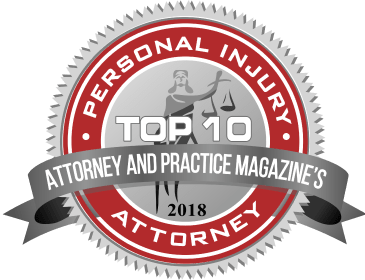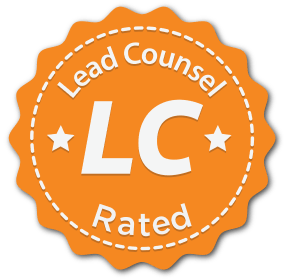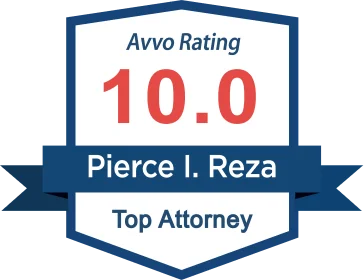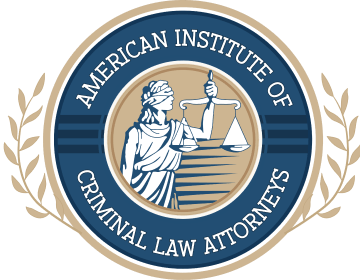Traumatic Brain Injury Attorney in California
Brain injuries are complex and potentially life-altering medical conditions that can lead to various physical, cognitive, and emotional challenges for individuals who have experienced them. At Oracle Law Firm | Accident & Injury Attorneys, we understand the importance of our personal injury lawyers being well-informed about understanding traumatic brain injuries themselves, as they are frequently the subject of legal cases involving personal injury, medical malpractice, and disability claims. Being Top-Rated Traumatic Brain Injury Lawyers, our goal is to equip our clients with the necessary knowledge to navigate the complexities of cases with personal injury attorneys involving brain injuries effectively.


Why Choose Oracle Law Firm | Accident & Injury Attorneys?
Choosing Oracle Law Firm | Accident & Injury Attorneys for your brain injury case means partnering with a team of experienced, skilled brain injury attorneys committed to your best interests. We pride ourselves on our:
Expertise: Our attorneys have extensive knowledge of brain injury cases and the legal and medical aspects. This expertise allows us to build solid client points and navigate the complex legal landscape.
Client-Centered Approach: We understand the unique challenges and needs of individuals with brain injuries and tailor our representation to each client’s circumstances. Our compassionate approach ensures our clients receive the support and guidance they need throughout the legal process.
Track Record of Success: Oracle Law Firm | Accident & Injury Attorneys has a proven track record of successfully advocating for clients with brain injuries, obtaining favorable settlements and verdicts that help them secure the compensation they deserve.
Comprehensive Support: Our team is dedicated to providing comprehensive legal support, from the initial consultation to the case resolution. We work closely with our clients, their families, and medical professionals to ensure that their needs are met, and their rights are protected.
Types of Brain Injuries
Traumatic Brain Injury (TBI)
A Traumatic Brain Injury (TBI) is brain trauma that occurs when an external force, such as a blow, jolt, or penetrating object, causes damage to the brain. TBIs are commonly associated with falls, motor vehicle accidents, sports injuries, and physical assaults. The severity of a TBI can range from mild to severe, depending on the extent of head trauma and the damage to the brain.
Types of TBI (Traumatic Brain Injuries):
Concussion
A concussion is a mild TBI, typically caused by a sudden impact or jolt to the head. While usually not life-threatening, concussions can still result in temporary cognitive and physical impairments.
Contusion
A cerebral contusion is a bruise on the brain tissue, often resulting from a direct impact on the head. Contusions can lead to swelling and bleeding in the brain, which may require surgical intervention. This is considered to be a severe TBI.
Diffuse Axonal Injury
Diffuse Axonal Injury (DAI) is caused by the shearing forces generated during rapid acceleration or deceleration of the head, often seen in car accidents or shaken baby syndrome. DAI damages the brain’s white matter and can lead to significant cognitive and functional impairments.
Penetrating Injury
Penetrating injuries occur when an object pierces the skull and enters the brain tissue. These injuries can cause severe brain damage and are often life-threatening.
Acquired Brain Injury (ABI)
An Acquired Brain Injury (ABI) is a type of traumatic brain injury claim not caused by external forces but rather by internal events or conditions such as a lack of oxygen, stroke, or infection. ABIs can result from various medical events or conditions and may lead to long-lasting or permanent disabilities.
Types of ABI:
Anoxic Brain Injury
Anoxic Brain Injury occurs when the brain is completely deprived of oxygen, leading to widespread cell death and severe neurological damage.
Hypoxic Brain Injury
Hypoxic Brain Injury results from a partially reduced oxygen supply to the brain. This type of traumatic brain injury case can lead to varying degrees of cognitive and functional impairments, depending on the severity and duration of oxygen deprivation.
Stroke
A stroke is an interruption of blood flow to a part of the brain, either due to a blood clot (ischemic stroke) or a burst blood vessel (hemorrhagic stroke), which causes brain bleed. Strokes can cause a wide range of neurological impairments and disabilities, depending on the affected area of the brain.
Tumors and Infections
Brain tumors and infections, such as meningitis or encephalitis, can cause acquired injuries by directly damaging brain tissue or indirectly through inflammation and pressure on the brain.
Signs and Symptoms of Brain Injuries
Mild Brain Injuries
Mild brain injuries, such as concussions, often present with temporary symptoms that resolve within days or weeks. These may include headache, dizziness, confusion, fatigue, blurred vision, and difficulty concentrating or remembering new information. In some cases, individuals may also experience mood changes or sleep disturbances.
Moderate Brain Injuries
Moderate or mild traumatic brain injuries can lead to more persistent and severe symptoms lasting for weeks or months. Some common symptoms of mild traumatic brain injury include persistent headaches, dizziness, nausea, loss of coordination, memory problems, difficulty with speech or language, and changes in mood or behavior.
Severe Brain Injuries
Severe brain injuries may result in life-threatening or life-altering symptoms, such as unconsciousness or coma, seizures, loss of motor function, profound cognitive deficits, and significant changes in personality or behavior. These injuries often require long-term medical care and rehabilitation and may lead to permanent disabilities.
Long-term Effects
The long-term effects of brain injuries can vary greatly depending on the type and severity of the injury, as well as the individual’s age, overall health, and access to appropriate medical care and rehabilitation. Some possible long-term effects include cognitive impairments, emotional and behavioral changes, chronic pain, and difficulty with daily activities or maintaining relationships. In some cases, brain injuries may also increase the risk of developing neurodegenerative conditions, such as Alzheimer’s or Parkinson’s disease.
Diagnosing Brain Injuries
Medical History and Physical Examination
The diagnostic process for brain injuries typically begins with a thorough medical history and physical examination. This may involve gathering information about the injury’s circumstances, assessing the patient’s consciousness and cognitive function level, and checking for signs of neurological damage, such as muscle weakness or altered reflexes.
Imaging Techniques
CT Scan
Computed Tomography (CT) scans are often used to diagnose brain injuries, as they provide detailed images of the brain’s structure and can reveal abnormalities such as bleeding, swelling, or fractures.
MRI
Magnetic Resonance Imaging (MRI) is another imaging technique that can be used to diagnose brain injuries. MRIs provide even more detailed images than CT scans and are particularly useful for identifying subtle changes in the brain tissue, such as diffuse axonal injury.
PET Scan
Positron Emission Tomography (PET) scans can assess brain function by measuring the brain’s metabolic activity. While not typically used as a primary diagnostic tool for brain injuries, PET scans can help identify areas of reduced function in the brain and guide treatment or rehabilitation strategies.
Cognitive and Neuropsychological Assessments
Cognitive and neuropsychological assessments play a crucial role in diagnosing and evaluating the extent of brain injuries. These tests assess various aspects of cognitive function, such as memory, attention, problem-solving, and language skills. The results can provide valuable information about the severity of the injury, guide treatment planning, and help predict long-term outcomes.
Treatment and Rehabilitation
Emergency Care
The immediate treatment of brain injuries often focuses close medical attention on stabilizing the patient and addressing life-threatening complications. Emergency care may include ensuring the patient can breathe adequately, maintaining blood pressure, and preventing further injury to the head or neck. In some cases, emergency surgery may be necessary to relieve stress on the brain or repair skull fractures.
Medications
Medications can be crucial in managing the symptoms and complications associated with brain injuries. Depending on the type and severity of the injury, medications may be used to control pain, reduce swelling or inflammation, prevent seizures, or manage mood and sleep disturbances.
Surgery
Surgical interventions may be necessary for some brain injuries, particularly in severe traumatic brain injury or acquired brain injury resulting from tumors or infections. Surgery may involve removing blood clots, repairing skull fractures, relieving pressure on the brain, or removing damaged brain tissue.
Rehabilitation Therapies
Rehabilitation therapies are essential for promoting recovery and maximizing function after a brain injury. The specific treatments required will depend on the individual’s needs and the extent of the damage. These therapies often involve a multidisciplinary team of professionals, including physical therapists, occupational therapists, speech and language therapists, and neuropsychologists.
Physical Therapy
Physical therapy improves physical function, mobility, and strength after a brain injury. This may involve exercises to improve balance and coordination, stretching and strengthening exercises, and assistive devices to help with mobility.
Occupational Therapy
Occupational therapy focuses on helping individuals with brain injuries regain the skills necessary to perform daily activities, such as dressing, bathing, and cooking. This may involve adaptive equipment, environmental modifications, and strategies for improving cognitive and motor function.
Speech and Language Therapy
Speech and language therapy addresses communication difficulties arising after a brain injury. This may involve exercises to improve speech clarity and language comprehension and alternative communication methods, such as sign language or communication devices.
Neuropsychological Therapy
Neuropsychological therapy addresses the cognitive and emotional challenges associated with brain injuries. This may involve strategies to improve memory, attention, problem-solving skills, and techniques for managing emotional and behavioral changes.
Legal Implications of Brain Injuries
Personal Injury Law
Brain injuries can have significant legal implications for personal injury claims, as they often result from accidents or incidents caused by another party’s negligence or wrongful actions. Personal injury lawsuit seeks to protect the rights of individuals who have suffered harm due to the negligence or illegal conduct of others, a car accident, or physical assault, and to ensure they receive fair compensation for their injuries and losses.
Compensation and Damages
Individuals who have sustained a brain injury due to the negligence or wrongful actions of another party may be entitled to compensation for their brain injury claim a range of damages, including:
Medical Expenses
Compensation may cover the cost of medical treatment, rehabilitation, ongoing care, and medical bills related to brain injury. This and other medical costs and bills include hospitalization, surgery, medications, therapies, and assistive devices.
Lost Income
Individuals who have experienced a brain injury may be unable to work temporarily or permanently, resulting in a loss of income and compensation. Compensation may include wages lost due to the injury and financial compensation such as the loss of future earning capacity if the individual cannot return to their previous occupation or work in any capacity.
Pain and Suffering
Compensation may also be awarded for the physical pain and suffering from the brain injury. This can include the severity of the head injury, the duration of the pain, and any ongoing or chronic pain associated with the head or brain injury law or itself.
Emotional Distress
Brain injuries can lead to significant emotional distress, including anxiety, depression, and changes in personality or behavior. Compensation may be awarded for the emotional and psychological impact of the injury on the individual and their family.
Types of Cases Handled by Oracle Law Firm | Accident & Injury Attorneys Traumatic Brain Injury Lawyer
Oracle Law Firm | Accident & Injury Attorneys is experienced in handling a variety of traumatic brain injury cases, including:
Automobile Accidents
Car accidents are a leading cause of traumatic brain injuries. Our firm represents clients who have sustained a serious brain injury or injuries in a motor vehicle accident, accidents caused by the negligence of other drivers, defective vehicles, or hazardous road conditions.
Workplace Accidents
Workplace accidents can result in brain injuries, particularly in industries with a high risk of falls, heavy equipment, or hazardous materials. We advocate for clients who have experienced traumatic brain injury symptoms from injuries at work due to unsafe working conditions or employer negligence.
Medical Malpractice
Brain injuries may also result from medical errors or negligence, such as surgical errors, misdiagnosis, or improper medical treatment. Our firm is skilled in using medical experts and handling complex medical malpractice cases involving brain injuries.
Sports-Related Injuries
Sports-related head injuries can lead to traumatic brain injuries, particularly in contact sports like football or hockey. Oracle Law Firm | Accident & Injury Attorneys represents clients who have experienced traumatic brain injury caused by injuries due to inadequate safety measures, negligent coaching, or defective sports equipment.
Prevention Strategies
While not all head injuries can be prevented, several strategies can help reduce the risk of these serious injuries and promote safety in various settings:
Road Safety
Following road safety measures can significantly decrease the risk of head injuries from automobile accidents. This includes obeying traffic laws, wearing seat belts, avoiding distractions while driving, and maintaining vehicles in good working condition.
Workplace Safety
Employers should implement and enforce workplace safety protocols to minimize the risk of head injuries. This may involve providing proper training, maintaining safe working conditions, supplying appropriate protective equipment, and addressing potential hazards promptly.
Sports Safety
To reduce the risk of sports-related head trauma and injuries, athletes, coaches, and organizations should prioritize safety measures such as wearing appropriate protective gear, following proper techniques, and adhering to rules designed to prevent injury. Additionally, promoting a culture of concussion awareness and prompt reporting of injuries can help ensure athletes receive timely care and avoid further harm.
Public Awareness and Education
Raising public awareness about serious brain injuries and their prevention is crucial for reducing their incidence. This can involve educating individuals about the risks associated with certain activities, promoting safety measures, and advocating for policies that support severe brain injury prevention.
The Impact of Brain Injuries on Individuals and Families
Brain injuries can have profound and lasting effects on individuals and their families, leading to physical, cognitive, emotional, and financial challenges. Understanding these injuries’ complexities and consequences is essential for providing those affected with the best care, support, and legal representation.
Oracle Law Firm | Accident & Injury AttorneysCommitment to Clients with Brain Injuries
At Oracle Law Firm | Accident & Injury Attorneys, we are committed to providing comprehensive, compassionate, and effective legal representation to clients who are brain injury survivors who have experienced brain injuries. Our team understands the unique challenges these traumatic brain injury cases can present and is dedicated to pursuing justice and fair compensation for our clients.
Seeking Legal Assistance for Brain Injury Cases
If you or a loved one has suffered a brain injury due to another party’s negligence or wrongful actions, seeking legal assistance can protect your rights and secure the compensation you deserve. The experienced attorneys at Oracle Law Firm | Accident & Injury Attorneys are here to help you navigate the complex legal landscape of brain injury claims cases and advocate for your best interests.
Frequently Asked Questions

What is the statute of limitations for brain injury cases?
The statute of limitations for brain injury cases can vary depending on the jurisdiction and the case’s specific circumstances. Generally, personal injury cases have a time limit within which a claim must be filed, often ranging from one to three years from the date of the injury. It is essential to consult with an experienced attorney as soon as possible to ensure you do not miss any deadlines for filing your brain injury claim.
How is compensation calculated in a brain injury case?
Compensation in a brain injury case is determined based on several factors, including the severity of the injury, the extent of medical expenses, the impact on the individual’s ability to work, and the emotional and psychological consequences of the serious traumatic brain injury claim. A skilled attorney will work closely with medical experts, economists, and other specialists to accurately assess the full scope of damages and pursue fair compensation on your behalf.
How long does it take to resolve a brain injury case?
The duration of a brain injury case can vary significantly depending on the case’s complexity, the parties’ willingness to negotiate, and the court’s schedule. Some patients may settle relatively quickly, while others may take several years to resolve, mainly if a trial is necessary. An experienced brain injury attorney can provide a more accurate timeline based on the specifics of your case.
How can I prove that someone else was at fault for my brain injury?
To prove that another party was at fault for your brain injury, you and the traumatic brain injury attorney will need to demonstrate that the party acted negligently or wrongfully and that their actions directly caused your injury. This typically involves gathering evidence, such as witness statements, photographs, medical records, and expert testimony, to build a strong case. An experienced brain injury attorney can help you navigate this process and gather the necessary evidence to prove fault.
Will my brain injury case go to trial?
While many brain injury cases are resolved through negotiation and settlement, some cases may proceed to trial if a fair agreement cannot be reached. Your attorney will work diligently to negotiate a favorable settlement on your behalf. Still, if necessary, they will also be prepared to represent you in court and present a solid case for a judge or jury.
How do I choose the right attorney for my brain injury case?
Selecting the right attorney for your brain injury case is critical to successful outcomes. Look for an attorney with extensive experience handling brain injury cases, a proven track record of success, and a client-centered approach. Additionally, choose a lawyer who is compassionate, understanding, and responsive to your needs and concerns. The personal injury attorneys at Oracle Law Firm | Accident & Injury Attorneys possess these qualities and are dedicated to providing exceptional representation to clients with brain injuries.

Contact Oracle Law Firm | Accident & Injury Attorneys for a free consultation
To schedule your free and confidential case review call us at 888-597-4099 or fill out the form below.
Experience the unique Assurance-Plus Promise at Oracle Law Firm | Accident & Injury Attorneys: Renowned Personal Injury Lawyers in California
Our team of distinguished personal injury attorneys in California operates on a unique contingency basis, implying that we will only receive a penny if you win your case! It’s our job to handle the intricate legal navigation needed to persuade the insurance company to provide the compensation you deserve. It is crucial to engage an attorney with significant resources.
Benefits Of A Free Consultation
Hiring a personal injury attorney puts a professional advocate on your side who has your best interests in mind. They can offer you peace of mind and the assurance that you’re moving towards the best possible outcome in a difficult situation.
Experience The Difference With Us
We don’t bow to insurance companies’ pressure to settle claims. Our mission is to reach a settlement that truly compensates you for the injuries sustained in your car accident. Leveraging years of expertise and successful settlements, we have the resources and skills to secure substantial payments. Our principal office in Orange County, Oracle Law Firm | Accident & Injury Attorneys, has the latest legal tools to assist clients in achieving impressive settlements.
Our presence extends beyond the main office, with branches across various California locations. We’ve strategically positioned our offices in Orange County, San Diego, San Bernardino, Los Angeles, and Riverside. We’ll come to you, irrespective of where you’re in the beautiful state of California. Our recognized personal injury law firm is ready to serve you anywhere!
Awards & Recognitions










